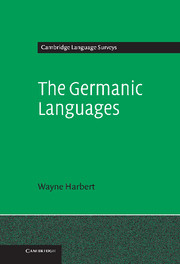Book contents
- Frontmatter
- Contents
- List of tables
- List of language abbreviations
- Acknowledgments
- 1 Introduction
- 2 The Germanic lexicon
- 3 The sound systems of Germanic: inventories, alternations and structures
- 4 The Germanic nominal system: paradigmatic and syntagmatic variation
- 5 The verbal systems of Germanic: paradigmatic and syntagmatic comparison
- 6 The syntax of the clause
- References
- Index
- Frontmatter
- Contents
- List of tables
- List of language abbreviations
- Acknowledgments
- 1 Introduction
- 2 The Germanic lexicon
- 3 The sound systems of Germanic: inventories, alternations and structures
- 4 The Germanic nominal system: paradigmatic and syntagmatic variation
- 5 The verbal systems of Germanic: paradigmatic and syntagmatic comparison
- 6 The syntax of the clause
- References
- Index
Summary
The focus of this chapter is in fact considerably narrower than the title might suggest. The study of the lexicons of languages is a multifaceted pursuit. The words of a language are the interface between its internal aspect, as a cluster of linguistic systems, and its external aspect, as a way of encoding and cataloguing the experiences of its speakers (Lass 1994: 178). Study of the lexicon thus straddles the study of purely linguistic aspects of language and the more general study of culture, since the vocabularies of languages are shaped by and reflect the intellectual and material culture in which their speakers function. Both of these are worthwhile undertakings. Much can be learned about the developmental histories of societies by studying the ways in which their vocabularies change over time. Indeed, in the case of cultures no longer extant, language often provides prospects for a reconstruction of the life of the mind which is finer-grained and more nuanced than what is possible through the more ambiguous and indirect evidence of physical remains and artifacts. The GMC languages in particular possess rich and multilayered lexicons which, when carefully examined, can generate an intricate picture of contacts, events, influences and cultural trends spanning millennia, even in the absence of a direct historical record. However, the focus of the present volume is on the GMC languages as systems and structures, and in keeping with that focus I will forego discussion of the possibilities for linguistic archaeology which the GMC lexicon affords, and concentrate exclusively on its more purely linguistic aspects – on the processes of word formation and the ways in which the shape of the lexicon and changes in the lexicon affect the other linguistic subsystems of the language.
- Type
- Chapter
- Information
- The Germanic Languages , pp. 21 - 40Publisher: Cambridge University PressPrint publication year: 2006



